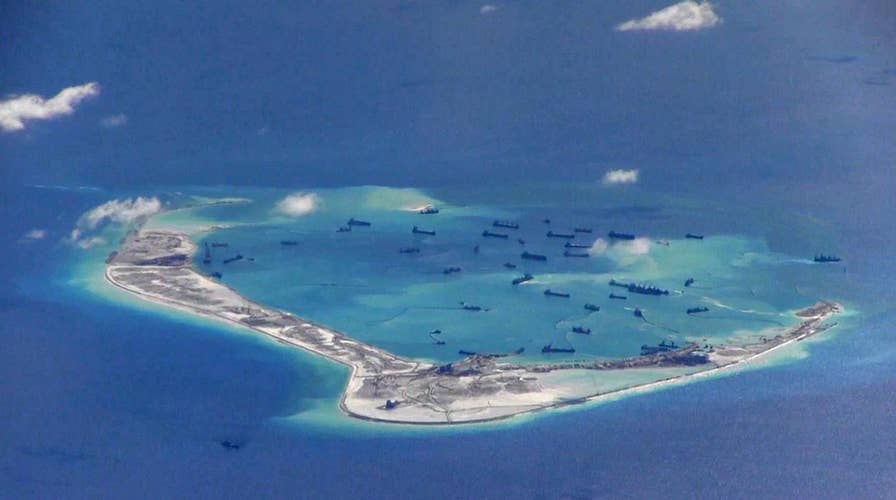South China Sea conflict explained
Tensions in the South China Sea are growing as China rapidly develops man-made islands in the critical waterway. Fox News explains the conflict in the region and why the U.S. is paying close attention
A U.S. Navy patrol sent a guided missile destroyer past a group of man-made islands in the contested South China Sea this week.
The USS Dewey was involved in the event, which took place Thursday around Mischief Reef, an artificial island China has built and fortified to assert its claims over the strategic waterway.
The U.S. destroyer allegedly "trespassed" near islands in which China has "indisputable sovereignty," a Chinese Foreign Ministry spokesman said.
However, a number of countries claim areas in the South China Sea. Here's what to know.
China's stance
China claims sovereignty of virtually all of the South China Sea. The country has aggressively tried to fortify its foothold by turning seven mostly submerged reefs into island outposts, some with runways and radars and, more recently, weapons systems.
The man-made islands are primarily for civilian purposes and to increase safety for ships, China claims. The superpower has said it won't interfere with freedom of navigation or overflight.
However, there have been questions about if that includes military ships and aircraft.
The work is opposed by the other claimants to the atolls and the United States. They're wary of restrictions on ship movements in a key waterway for world trade.
CHINA WARNED NAVY DESTROYER USS DEWEY TO LEAVE AREA NEAR MAN-MADE ISLAND, OFFICIAL SAYS
What's in the South China Sea?
The South China Sea boasts rich fishing grounds and a potential wealth of undersea oil, gas and mineral deposits.
Eleven million barrels of oil and 190 trillion cubic feet of natural gas may be there, according to a 2013 report from the U.S. Energy Information Administration.
Major disputes
The Paracels, a group of islands and reefs, are occupied by China but are also claimed by Vietnam and Taiwan.
Those three countries also each claim the Spratly Islands, which are located further south, CNN reported. Brunei, Malaysia and the Philippines likewise claim several of the Spratlys or waters nearby, the report said.
What has been determined?
An international tribunal in The Hague last year rejected most of China's claims to the water. China's reclamation was aggravating tensions and violating the sovereignty of fellow claimant the Philippines, the tribunal said.
The ruling, however, has been ignored by China.
BEIJING PROTESTS US NAVY PATROL THROUGH SOUTH CHINA SEA
What about the incident with the USS Dewey around Mischief Reef?
Thursday's incident was the first U.S. challenge to Beijing's claims to the waters since President Donald Trump took office.
Washington has previously said that it has the right to conduct so-called freedom of navigation operations, or FONOPS, in the area because it is in international waters.
U.S. forces in the Asia-Pacific region will continue to conduct freedom of navigation operations to "challenge excessive maritime claims in order to preserve the rights, freedoms, and uses of the sea and airspace guaranteed to all nations under international law," U.S. Defense Department spokesman Maj. Jamie Davis said in an emailed statement.
"FONOPS are not about any one country, nor are they about making political statements," Davis said.
The Associated Press contributed to this report.

